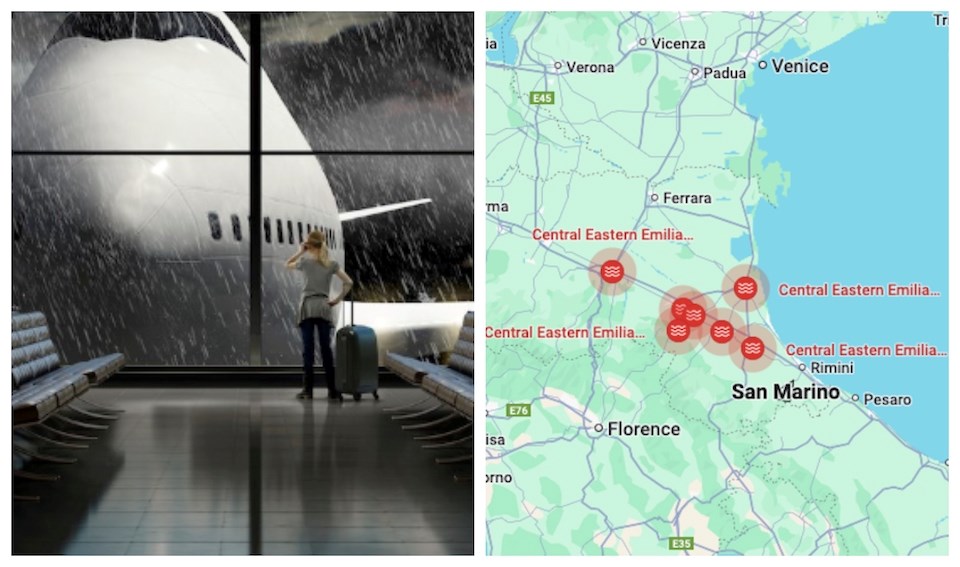Metro Vancouverites headed on a European trip soon should stay up to date about a couple of dangerous weather events.
Low-pressure system "Boris" is wreaking havoc across large swaths of Eastern and Central Europe, with extensive flooding across central Europe claiming the lives of 24 people so far.
The storm system has affected areas as far north as Poland and down south in Romania. In Central Europe, the receding waters revealed the scale of the destruction caused by exceptionally heavy rains that began a week ago.
A massive flood wave threatened new areas and heavy rains also caused flooding and evacuation of some 1,000 people in the northern Italian region of Emilia-Romagna.
Meanwhile, wildfires rage across Portugal, with thick grey smoke and the smell of burnt wood reaching across the border into northwest Spain.
Vancouver International Airport (YVR) hasn't posted any travel advisories but the airport always encourages travellers to check advisories for their destination, including weather forecasts and Canada's current destination-specific advice.
What do travellers from Metro Vancouver need to consider?
Travellers departing from Vancouver should check local weather and conditions at their destination before heading to the airport. They should also check airport conditions in places en route to their destinations to see how they may impact travel.
YVR's flight departures page shows some delays for trips heading to Europe, including one with Edelweiss Air to Zürich. The airport provides details about the new time and the gate location but does not indicate the reason for the delay. Switzerland does not have any flood warnings at this time but its airport may incur some delays or cancellations related to the fight ecosystem in Europe (cancellations and delays at other large airports have continental ramifications).
Other flights from YVR are delayed or cancelled to destinations across Canada and the United States.
YVR's flight arrivals page shows some delays from Europe, including Air Canada from London-Heathrow, KLM Royal Dutch Airways from Amsterdam, Lufthansa from Munich, and Turkish Airlines from Istanbul.
Locals should also book travel insurance with trip interruption, trip cancellation, medical for over $5 million, and comprehensive baggage loss and delay. Passengers are advised to read the fine print of their policy closely.
Air Canada told V.I.A. it hasn't adjusted any of its travel advice at this time but added that it is "evaluating and monitoring these weather events."
Any changes to tickets are "as per the conditions of the fare type purchased," the airline stated.
Flooding in Europe
Many locals visiting European destinations severely impacted by flooding require a stopover en route to their destination. While they may not see any flight delays on the first portion of their journey - such as a flight from YVR to Toronto Lester B. Pearson International Airport (YYZ) - they may encounter difficulty heading overseas.
Other locals may not encounter difficulties until they reach Europe. Many flights to more remote cities across Eastern Europe require a flight out of a larger European airport, meaning the first flight overseas may run on time.
Checking Canada's travel advisories may not be useful in evaluating if it is safe to travel during some weather events. For example, Poland has declared its "first-ever state of natural disaster," with extensive flooding in its Southern regions claiming one life. Canada's advisory does not make note of any travel concerns in Poland.
Italy, one of the top destinations for residents of the Great White North, is seeing most of its flooding in the Emilia-Romagna region. Over 300,000 people live in its capital, Bologna (see slide two).
Travellers should avoid flood-stricken regions and may want to re-book travel plans during the storm.
Canadians should always register trips they take online before they leave so that the government can contact them in an emergency.
Portugal fires
More than 100 wildfires stretched thousands of firefighters to the limit in northern Portugal on Wednesday, with seven deaths since the worst spate of fires in recent years spread out of control over the weekend.
The European Copernicus satellite service said that over 15,000 hectares (37,000 acres) were scorched and a combined 13 kilometres (8 miles) of fire fronts were detected as of Tuesday night. It added that an area home to 210,000 people was exposed to the fire risk.
Portugal has declared a State of Calamity and travellers should avoid visiting any areas impacted by the fires.
The largest and capital city, Lisbon, isn't located in an area affected by the fires. Most of them are burning in the country's northern areas (see slide three).
WestJet did not respond by V.I.A.'s deadline regarding flooding but does not fly to Portugal.
With files from the Associated Press.
Find more information about exciting destinations in B.C. and across the globe, as well as travel deals and tips, by signing up for V.I.A.'s weekly travel newsletter The Wanderer. Since travel deals can sell out, find out the day they are posted by signing up for our daily Travel Deals newsletter.
Want to learn more about a specific destination or have a travel concern or idea you would like V.I.A. to write about? Email us at [email protected]. Send us stories about recent holidays that you've been on, or if you have any tips you think our readers should know about.



